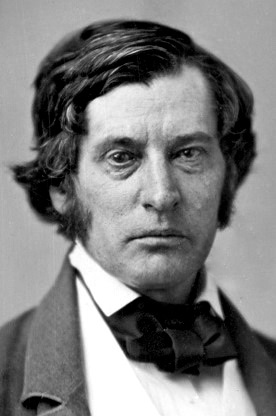Proposed amendment https://books.google.com/books?id=pmZEAQAAIAAJ&pg=PA24&dq=%22james+madison%22+%22property+in+man%22&hl=en&sa=X&ved=0ahUKEwiwiczw5s_LAhVMOT4KHaM8CdMQ6AEINDAA#v=onepage&q=%22james%20madison%22%20%22property%20in%20man%22&f=false (8 April 1864)
Charles Sumner: Frases en inglés
The Crime Against Kansas speech (May 19-20, 1856)
Speech https://books.google.com/books?id=HGM9AQAAMAAJ&pg=PA5172&lpg=PA5172&dq=%22Worse+than+any+heathen+or+pagan+abroad+are+those+in+our+midst+who+are+false+to+our+institutions.%22&source=bl&ots=n-wpUEfhND&sig=wHyJSOd8M1rswurZUUnUgAFrTn0&hl=en&sa=X&ved=0ahUKEwjXtt2swKjLAhWFGD4KHWCjBDsQ6AEIHDAA#v=onepage&q=%22Worse%20than%20any%20heathen%20or%20pagan%20abroad%20are%20those%20in%20our%20midst%20who%20are%20false%20to%20our%20institutions.%22&f=false (4 July 1870)
"The Crime against Kansas," speech in the Senate (May 18, 1856). The claims made against Senator Andrew Butler of South Carolina so angered Butler's cousin, Democrat Representative Preston Brooks, that Brooks assaulted Sumner with a cane in the Senate chamber a few weeks later
“Worse than any heathen or pagan abroad are those in our midst who are false to our institutions.”
Speech https://books.google.com/books?id=HGM9AQAAMAAJ&pg=PA5172 (1870)
"True Grandeur of Nations," oration before the authorities of the City of Boston (July 4, 1845)
“You must take care of the civil rights bill - my bill, the civil rights bill - don't let it fail.”
Last words https://web.archive.org/web/20010407205532/http://republicanbasics.com/Cover_Photos/cover_photos.html
As quoted in "First African American Senator" http://www.senate.gov/artandhistory/history/minute/First_African_American_Senator.htm, United States Senate
As quoted in "The Ideology of the Republican Party" https://books.google.com/books?id=5Cl2cVkEV9wC&pg=PA65&dq=%22the+party+of+emancipation%22+GOP&hl=en&sa=X&ved=0ahUKEwjW0tfNv5_LAhUJ8CYKHUxcBv4Q6AEILjAD#v=onepage&q=man's%20government&f=false, by Eric Foner, The Birth of the Grand Old Party: The Republicans' First Generation (2002), edited by Robert F. Engs and Randall M. Miller, Pennsylvania: University of Pennsylvania Press, p. 18
"Freedom National, Slavery Sectional," speech in the Senate (July 27, 1852).
“Ideas are more important than battles.”
As quoted in Lies My Teacher Told Me https://books.google.com/books?id=5m23RrMeLt4C&printsec=frontcover&dq=%22lies+my+teacher+told+me%22&hl=en&sa=X&ved=0CCYQ6AEwAGoVChMIgsHjgsrpxwIVBpANCh3kRgDA#v=snippet&q=even%20canada&f=false, by James W. Loewen
"Freedom National, Slavery Sectional," speech in the Senate (July 27, 1852)
Final speech in the U.S. Senate on Constitutional Amendment (9 March 1866)
Speech on "The Scholar, the Jurist, the Artist, the Philanthropist," oration before the Phi Beta Kappa Society at Harvard University at their anniversary (August 27, 1846)
“If a man has done evil in his life, he must not be complimented in marble.”
As quoted in Simon, James F., Lincoln and Chief Justice Taney (2006), Simon and Schuster, p. 268.
Memoir and Letters of Charles Sumner, Volume 4, p. 500, also cited in W. E. B. Du Bois, Black Reconstruction in America (1935), p. 592
